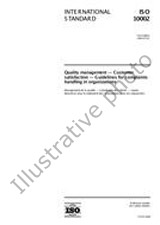We need your consent to use the individual data so that you can see information about your interests, among other things. Click "OK" to give your consent.

ISO/TR 11925-1:1999
Reaction to fire tests — Ignitability of building products subjected to direct impingement of flame — Part 1: Guidance on ignitability
Automatically translated name:
Reaction to fire tests -- Ignitability of building products subjected to direct impingement of flame -- Part 1: Guidance on ignitability
STANDARD published on 18.3.1999
The information about the standard:
Designation standards: ISO/TR 11925-1:1999
Publication date standards: 18.3.1999
SKU: NS-420544
The number of pages: 30
Approximate weight : 90 g (0.20 lbs)
Country: International technical standard
Category: Technical standards ISO
The category - similar standards:
Annotation of standard text ISO/TR 11925-1:1999 :
Description / Abstract: This Technical Report provides guidance on "ignitability" tests for building products. It describes the principles of ignitability and characterizes different ignition sources. The results of small-scale ignitability tests may be used as a component of a total hazard analysis of a specified fire scenario. It is therefore important that the flame or radiative source chosen is fully characterized so that relevant conclusions may be made from the test results. Guidance given in this Technical Report may also have relevance to other application areas (e.g. building contents, plastics, etc.)
We recommend:
Technical standards updating
Do you want to make sure you use only the valid technical standards?
We can offer you a solution which will provide you a monthly overview concerning the updating of standards which you use.
Would you like to know more? Look at this page.



 Cookies
Cookies
